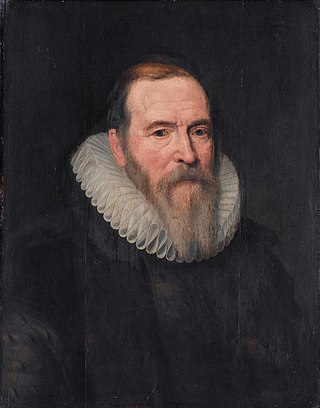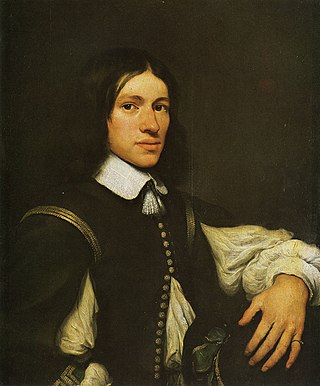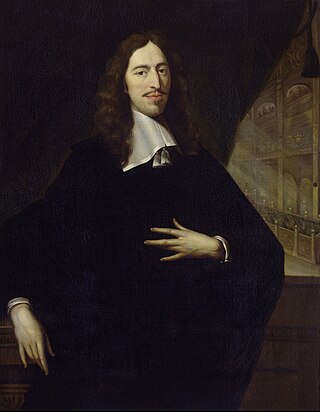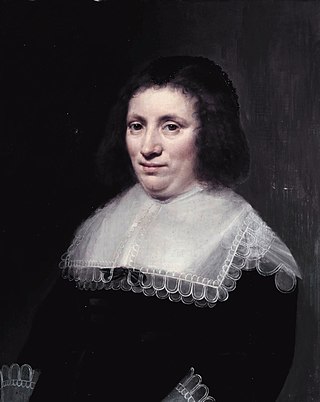Related Research Articles

Johan van Oldenbarnevelt, Heer van Berkel en Rodenrijs (1600), Gunterstein (1611) and Bakkum (1613) was a Dutch statesman and revolutionary who played an important role in the Dutch struggle for independence from the Habsburg Castilian empire.

Anthonie Heinsius was a Dutch statesman who served as Grand Pensionary of Holland from 1689 to his death in 1720.

A pensionary was a name given to the leading functionary and legal adviser of the principal town corporations in the Low Countries because they received a salary or pension.
The grand pensionary was the most important Dutch official during the time of the Dutch Republic. In theory, a grand pensionary was merely a civil servant of the Estates of the dominant province, the County of Holland, among the Seven United Provinces. In practice, the grand pensionary of Holland was the political leader of the entire Dutch Republic when there was no stadtholder at the centre of power.
Andries de Witt was Grand Pensionary of Holland between 1619 and 1621.

The siege of Groenlo was a siege of Groenlo during the Eighty Years' War and the Anglo–Spanish War by a Dutch and English army led by Maurice of Nassau after it had followed an unsuccessful siege by Maurice in 1595.

Gilles van Ledenberg was a Dutch statesman. He was secretary of the States of Utrecht from 1588 until his arrest for treason in 1618, together with Johan van Oldenbarnevelt. He committed suicide to prevent forfeiture of his assets, but he was sentenced to death posthumously and posthumously executed.
Rombout Hogerbeets was a Dutch jurist and statesman. He was tried for treason, together with Johan van Oldenbarnevelt, Hugo Grotius, and Gilles van Ledenberg during the political crisis of 1617–18 in the Dutch Republic, and sentenced to life-imprisonment. He shared Loevestein prison with Grotius.
Anthonie is a Dutch and masculine given name transliterated from Antonius in use in the Netherlands, Greenland, Suriname, Republic of Karelia, South Africa, Namibia, Belgium and Indonesia. The same spelling is a Norwegian feminine given name that is an alternate name to Antonie in use in Norway. The spellings Antonie and Anthonij were basically interchangeable in Dutch until the 19th century. Notable people with the name include:
François Vranck, was a Dutch lawyer and statesman who played an important role in the founding of the Dutch Republic.

The Hoge Raad van Holland, Zeeland en West-Friesland was the supreme court of the provinces of Holland and Zeeland in the Dutch Republic in the period 1582–1795. This court is considered a direct predecessor of the current Hoge Raad der Nederlanden. It played an important role in the formation of Roman-Dutch law, which still influences law in Southern Africa, through its jurisprudence.

The siege of Meurs took place between 29 August to 3 September 1597 during the Eighty Years' War and the Anglo–Spanish War. The Spanish occupied city of Moers under Governor Andrés de Miranda was besieged by Dutch and English troops under the command of Prince Maurice of Orange. The siege ended with the capitulation and the withdrawal of the Spanish garrison. The siege was part of Maurice's campaign of 1597 known as the Ten Glory Years, his highly successful offensive against the Spaniards.

The siege of Venlo of 1586, also known as the Capture of Venlo, was a Spanish victory that took place on June 28, 1586, at the city of Venlo, in the southeastern of Low Countries, near the German border, between the Spanish forces commanded by Governor-General Don Alexander Farnese, Prince of Parma, and the Dutch garrison of Venlo, supported by relief troops under Maarten Schenck van Nydeggen and Sir Roger Williams, during the Eighty Years' War and the Anglo-Spanish War (1585–1604). After two failed attempts to relieve the city, the siege ended on June 28, 1586, with the capitulation and the withdrawal of the Dutch garrison.

The Loevestein faction or the Loevesteiners were a Dutch States Party in the second half of the 17th century in the County of Holland, the dominant province of the Dutch Republic. It claimed to be the party of "true freedom" against the stadtholderate of the House of Orange-Nassau, and sought to establish a purely republican form of government in the Northern Netherlands.

The trial of Oldenbarnevelt, Grotius and Hogerbeets was the trial for treason of Johan van Oldenbarnevelt, Land's Advocate of Holland, Hugo Grotius, pensionary of Dordrecht, Rombout Hogerbeets, pensionary of Leiden, and their co-defendant Gilles van Ledenberg, secretary of the States of Utrecht by an ad hoc court of delegated judges of the States General of the Netherlands that was held between 29 August 1618 and 18 May 1619, and resulted in a death sentence for Oldenbarnevelt, and sentences of life in prison for Grotius and Hogerbeets. The trial was and is controversial for political and legal reasons: political, because it put the crown on the coup d'etat of stadtholder Maurice, Prince of Orange and his partisans in the States General of the Dutch Republic that ended the previous Oldenbarnevelt regime and put the Orangist party in power for the time being; legal, because the trial deprived the defendants of their civil rights under contemporary law, and the judges changed both the "constitution" of the Republic and its laws in an exercise of ex post facto legislation.

Maria van Reigersberch was the wife of Hugo Grotius, who helped him escape in 1621 from Loevestein Castle during his incarceration there after his 1619 trial.

Adriaan Teding van Berkhout was an eminent Dutch jurist, justice in the Hof van Holland, and politician of the Dutch Republic. He was a friend of Johan van Oldenbarnevelt, who tried to warn the latter of his impending arrest before the Trial of Oldenbarnevelt, Grotius and Hogerbeets.
Benjamin Aubery du Maurier was a French huguenot statesman and ambassador of his country to the States General of the Dutch Republic during the "Truce Quarrels". He tried in vain to save the life of Dutch statesman Johan van Oldenbarnevelt after he was sentenced to death in the Trial of Oldenbarnevelt, Grotius and Hogerbeets.

Reyer or Reynier Pauw, was an influential Amsterdam regent of the Golden Age. Pauw was pensionary and eight times mayor of Amsterdam. He was involved in the Compagnie van Verre, the VOC, and the trial of Johan van Oldenbarnevelt.
References
- Duyck, Anthonis (1862). Journaal van Anthonis Duyck (1591-1602). The Hague: Department of War.